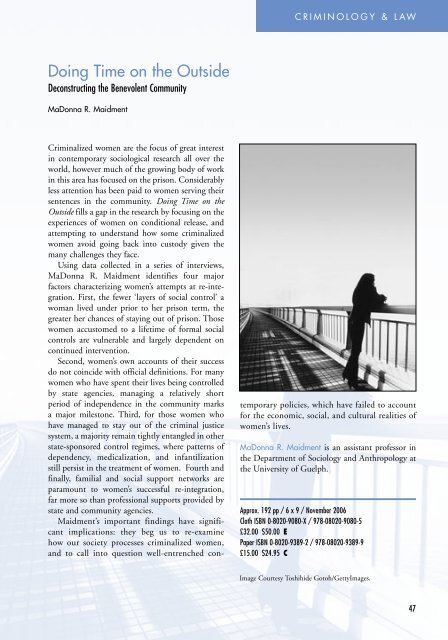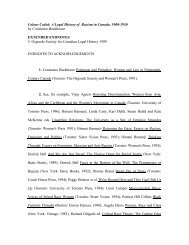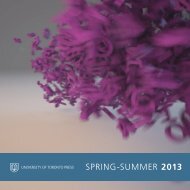Fall/Winter 2006 - University of Toronto Press Publishing
Fall/Winter 2006 - University of Toronto Press Publishing
Fall/Winter 2006 - University of Toronto Press Publishing
Create successful ePaper yourself
Turn your PDF publications into a flip-book with our unique Google optimized e-Paper software.
C R I M I N O L O G Y & L AW<br />
Doing Time on the Outside<br />
Deconstructing the Benevolent Community<br />
MaDonna R. Maidment<br />
Criminalized women are the focus <strong>of</strong> great interest<br />
in contemporary sociological research all over the<br />
world, however much <strong>of</strong> the growing body <strong>of</strong> work<br />
in this area has focused on the prison. Considerably<br />
less attention has been paid to women serving their<br />
sentences in the community. Doing Time on the<br />
Outside fills a gap in the research by focusing on the<br />
experiences <strong>of</strong> women on conditional release, and<br />
attempting to understand how some criminalized<br />
women avoid going back into custody given the<br />
many challenges they face.<br />
Using data collected in a series <strong>of</strong> interviews,<br />
MaDonna R. Maidment identifies four major<br />
factors characterizing women’s attempts at re-integration.<br />
First, the fewer ‘layers <strong>of</strong> social control’ a<br />
woman lived under prior to her prison term, the<br />
greater her chances <strong>of</strong> staying out <strong>of</strong> prison. Those<br />
women accustomed to a lifetime <strong>of</strong> formal social<br />
controls are vulnerable and largely dependent on<br />
continued intervention.<br />
Second, women’s own accounts <strong>of</strong> their success<br />
do not coincide with <strong>of</strong>ficial definitions. For many<br />
women who have spent their lives being controlled<br />
by state agencies, managing a relatively short<br />
period <strong>of</strong> independence in the community marks<br />
a major milestone. Third, for those women who<br />
have managed to stay out <strong>of</strong> the criminal justice<br />
system, a majority remain tightly entangled in other<br />
state-sponsored control regimes, where patterns <strong>of</strong><br />
dependency, medicalization, and infantilization<br />
still persist in the treatment <strong>of</strong> women. Fourth and<br />
finally, familial and social support networks are<br />
paramount to women’s successful re-integration,<br />
far more so than pr<strong>of</strong>essional supports provided by<br />
state and community agencies.<br />
Maidment’s important findings have significant<br />
implications: they beg us to re-examine<br />
how our society processes criminalized women,<br />
and to call into question well-entrenched contemporary<br />
policies, which have failed to account<br />
for the economic, social, and cultural realities <strong>of</strong><br />
women’s lives.<br />
MaDonna R. Maidment is an assistant pr<strong>of</strong>essor in<br />
the Department <strong>of</strong> Sociology and Anthropology at<br />
the <strong>University</strong> <strong>of</strong> Guelph.<br />
Approx. 192 pp / 6 x 9 / November <strong>2006</strong><br />
Cloth ISBN 0-8020-9080-X / 978-08020-9080-5<br />
£32.00 $50.00 E<br />
Paper ISBN 0-8020-9389-2 / 978-08020-9389-9<br />
£15.00 $24.95 C<br />
Image Courtesy Toshihide Gotoh/GettyImages.<br />
47
















